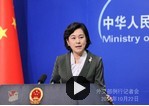Officials say U.S. may take unilateral action against Syria
WASHINGTON, Aug. 29 -- The United States may take unilateral action against Syria after Britain's House of Commons rejected a government attack plan, U.S. officials said Thursday.
Consultations with Britain will continue, but "President Obama's decision-making will be guided by what is in the best interests of the United States," White House National Security Council spokeswoman Caitlin Hayden said in a statement.
"He believes that there are core interests at stake for the United States and that countries who violate international norms regarding chemical weapons need to be held accountable," Hayden said.
Earlier in the day, both White House and State Department spokespersons said the United States would act in its own timeline.
Washington has been seeking coordinated military strikes on Syria with its allies in response to the alleged chemical weapons attack on Aug. 21 in the suburbs of Damascus, in which 1,300 people were reportedly killed.
However, British Prime Minister David Cameron pledged Thursday not to circumvent parliament and authorize military action against Syria after the killing of his motion that calls for "a strong humanitarian response from international society" that includes military operation.
Unilateral action by Washington was "a possibility" following the latest episode in London, the CNN quoted a senior U.S. official as saying.
"We care what they think. We value the process. But we're going to make the decision we need to make," the official said.
In an unclassified briefing for senior members of Congress Thursday evening, administration officials offered few details and no timeline for a possible attack on Syria, the Politico website said.
The officials told lawmakers via a conference call that they have "no doubt" chemical weapons were used by the Syrian government forces, and that Obama is still weighing his options, the Politico said, quoting a congressional source.
During the briefing, the lawmakers pressed the officials on a range of issues, including how military operations in Syria would be funded. The Politico said the officials offered no answer, but Defense Secretary Chuck Hagel agreed it was an important question and pledged to provide additional information before or soon after any attack is launched.
"The views of Congress are important to the president's decision-making process, and we will continue to engage with members as the president reaches a decision on the appropriate U.S. response to the Syrian government's violation of international norms against the use of chemical weapons," the White House said in a readout of the briefing.
It said 15 lawmakers asked questions during the 90-minute conference call joined as well by National Security Advisor Susan Rice, Secretary of State John Kerry, Director of National Intelligence James Clapper, and Vice Chairman of the Joint Chiefs of Staff Sandy Winnefeld.
Some lawmakers have been urging Obama to seek Congressional authorization before giving the order for operation against Syria.
Obama and his administration officials have said the impending U.S. military action will be "limited," while press reports said it will involve sea-launched cruise missiles or possibly long-range bombers.
The United Nations said its team of inspectors would leave Syria on Saturday and report the initial result of investigation to Secretary-General Ban Ki-moon on the alleged use of chemical weapons in Syria.
(Editor:DuMingming、Liang Jun)





















